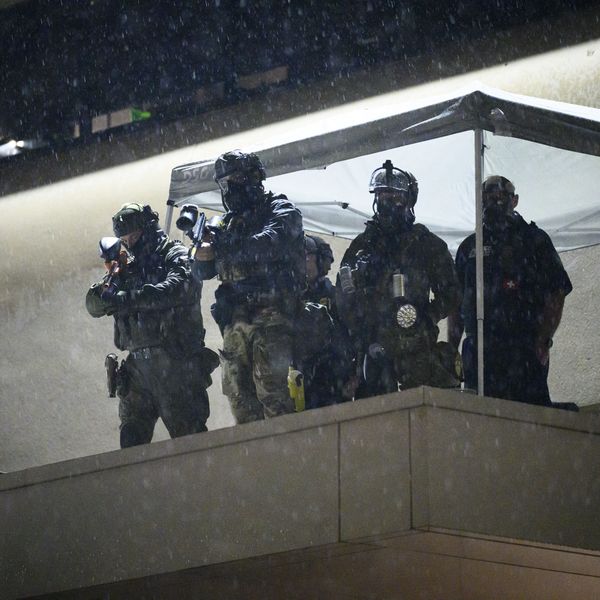A top State Department official on Thursday said that bombing oil pipelines controlled by Islamic State (or ISIS) in Syria is now a "viable option" under consideration by the U.S. military.
Julieta Valls Noyes, the US deputy assistant secretary for European and Eurasian Affairs, was in London and her comments were first reported by the British press. Citing figures that estimate ISIS is generating nearly $2 million every day by selling crude oil reserves it now controls, Noyes said that the U.S. may expand targeting of oil-related infrastructure inside Syria to include "kinetic strikes against some of the pipelines" and other "physical action to stop the flow."
"Bombing oil pipelines to get at ISIS's financing would be foolhardy... and provide anti-American groups anywhere in the world with a rationale for bombing pipelines on which we and our allies depend. The result could be global economic havoc." --Michael T. KlareAccording to the Independent, Noyes said that sale of fuel is one of the U.S. government's "principal concerns" regarding ISIS' ability to fund its ongoing military operations and that in addition to other methods to stem the group's the sale of oil "air strikes are a viable option."
Reacting to Noyes' comments, Michael T. Klare, a professor at Hampshire College who has written extensively on energy resources and U.S. foreign policy, told Common Dreams that any attempt to bomb oil pipelines in Syria would be a serious mistake with potentially far-reaching implications.
"Bombing oil pipelines to get at ISIS's financing would be a very foolhardy move," Klare stated in an email. "First of all, it would be almost impossible to determine that the pipelines were carrying oil produced by oilfields under ISIS's control, and second, there could be a considerable risk of civilian casualties from the resulting explosions. Bombing pipelines could also lead to massive oil spills and resulting environmental damage."
In addition, he said, attacking pipelines in any manner "would provide anti-American groups anywhere in the world with a rationale for bombing pipelines on which we and our allies depend. The result could be global economic havoc."
Since U.S.-led airstrikes inside Syria began last month, warplanes have already targeted refineries and other oil-related infrastucture held by ISIS. So far, however, targeting flowing pipelines has not been officially discussed.
The Telegraph reports:
Western officials say that Syria's own regime has been an important buyer of ISIL's oil. While President Bashar al-Assad poses as a sworn enemy of ISIL, officials from Western and Middle Eastern countries believe that he has deliberately created some of the conditions for the terrorist movement's rise in order to present himself as a bulwark against extremism.
If America were to destroy a pipeline taking oil from ISIL to the regime, this could be a way of weakening both Mr Assad and the terrorists. However, ISIL is also believed to smuggle oil to buyers in Turkey and Iraq. Most of those supplies are thought to go by tanker, not via pipelines.
ISIL's possession of oilfields has helped it to become one of the richest terrorist organisations in history. Control of these assets makes the movement financially self-sufficient, reducing its dependence on donors from elsewhere in the Middle East. In all, ISIL is believed to have amassed a war-chest running into the hundreds of millions of dollars.
According to Klare, however, if nations want to curtail ISIS' oil revenues, he suggests that other strategies are available that don't carry the same high-level risk associated with airstrikes. "The US should put diplomatic pressure on Turkey to crack down on black-market oil smugglers that operate in Turkish territory, and block any bank accounts used by ISIS to collect funds from such sales," Klare suggested. "These efforts would do much more to impede ISIS's funding while avoiding the risk of civilian casualties."
'The Oil Weapon'
In a recent TomDispatch essay discussing the targeting of oil infrastructure in Syria, Klare argued that the U.S. government--once on the receiving end of oil embargoes--has now initiated a new strategy of using "the oil weapon" by threatening sanctions, or in Syria's case - targeted airstrikes, to impede the ability of enemies to operate. According to Klare:
When first employed, the oil weapon was intended to exploit the industrial world's heavy dependence on petroleum imports from the Middle East. Over time, however, those producing countries became ever more dependent on oil revenues to finance their governments and enrich their citizens. Washington now seeks to exploit this by selectively denying access to world oil markets, whether through sanctions or the use of force, and so depriving hostile producing powers of operating revenues.
The most dramatic instance of this came on September 23rd, when American aircraft bombed refineries and other oil installations in areas of Syria controlled by the Islamic State of Iraq and Syria (ISIS, also known as ISIL or IS). An extremist insurgent movement that has declared a new "caliphate," ISIS is not, of course, a major oil producer, but it has taken control of oil fields and refineries that once were operated by the regime of Bashar al-Assad in eastern Syria. The revenue generated by these fields, reportedly $1 to $2 million daily, is being used by ISIS to generate a significant share of its operating expenses. This has given that movement the wherewithal to finance the further recruitment and support of thousands of foreign fighters, even as it sustains a high tempo of combat operations.
Black-market dealers in Iran, Iraq, Syria, and Turkey have evidently been assisting ISIS in this effort, purchasing the crude at a discount and selling at global market rates, now hovering at about $90 per barrel. Ironically, this clandestine export network was initially established in the 1990s by Saddam Hussein's regime to evade U.S. sanctions on Iraq.
The Islamic State has proven adept indeed at exploiting the fields under its control, even selling the oil to agents of opposing forces, including the Assad regime. To stop this flow, Washington launched what is planned to be a long-term air campaign against those fields and their associated infrastructure. By bombing them, President Obama evidently hopes to curtail the movement's export earnings and thereby diminish its combat capabilities. These strikes, he declared in announcing the bombing campaign, are intended to "take out terrorist targets" and "cut off ISIL's financing."
It is too early to assess the impact of the air strikes on ISIS's capacity to pump and sell oil. However, since the movement has been producing only about 80,000 barrels per day (roughly 1/1,000th of worldwide oil consumption), the attacks, if successful, are not expected to have any significant impact on a global market already increasingly glutted, in part because of an explosion of drilling in that "new Saudi Arabia," the United States.

